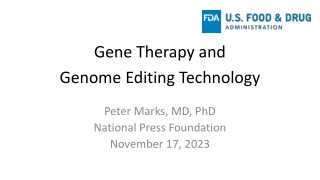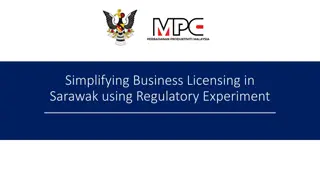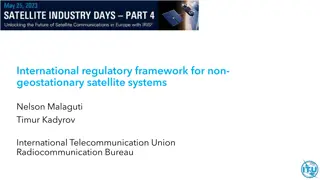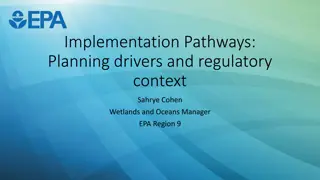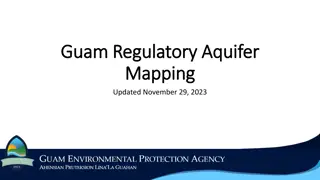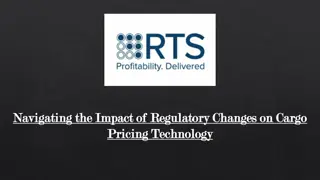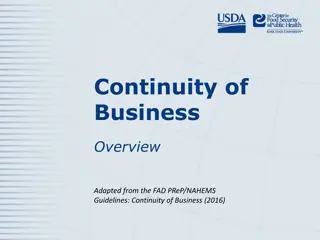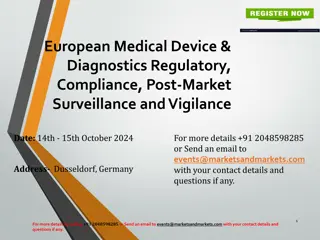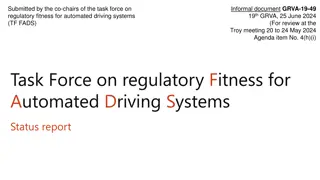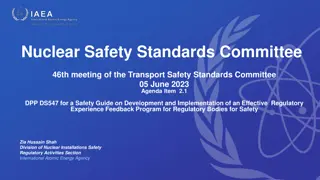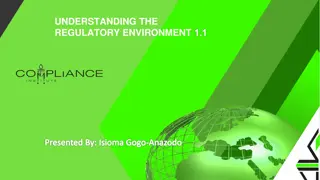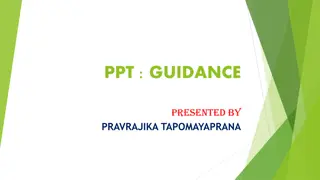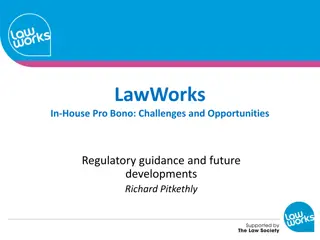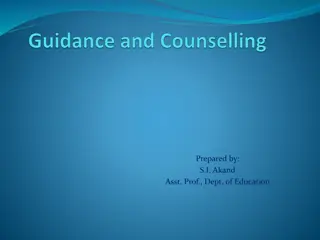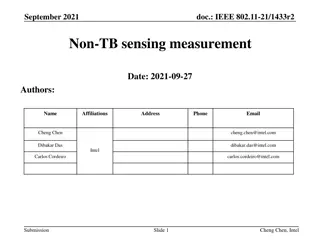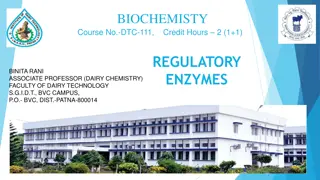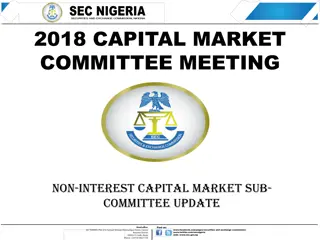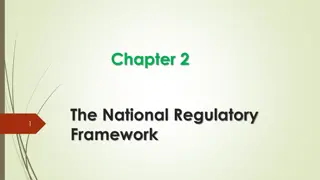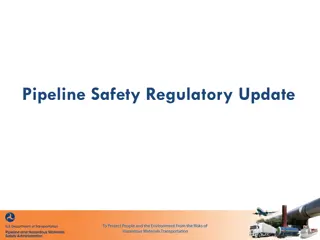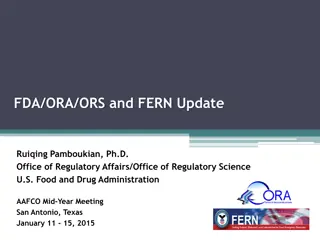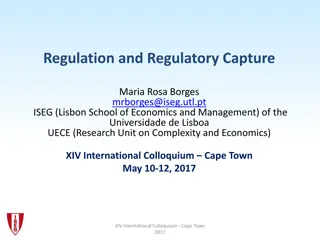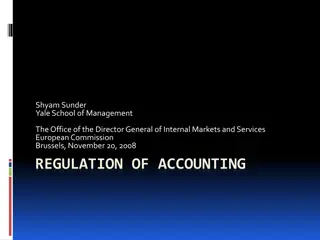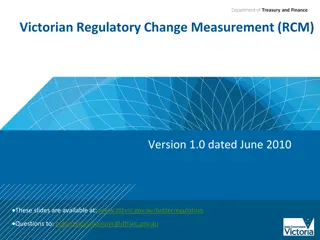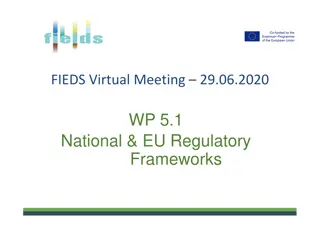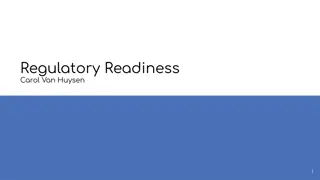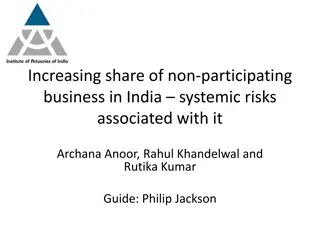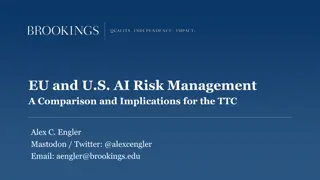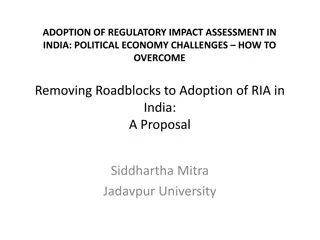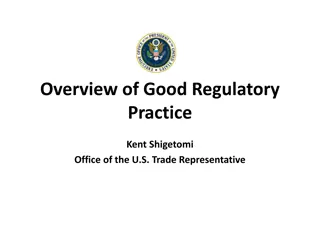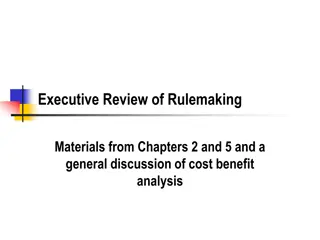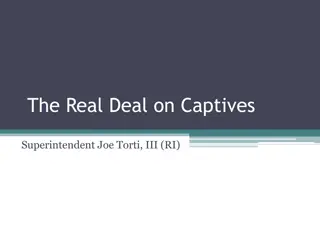Gene Therapy and Genome Editing Technology
This article provides insights into the status, regulatory considerations, and delivery methods of gene therapy and genome editing technologies. It discusses approved gene therapies in the US, human genome editing in clinical applications, and the regulatory authority of the FDA over gene therapy. T
3 views • 27 slides
Advanced Concepts in Purchase Card Management - Regulatory Guidance and Best Practices
Explore the regulatory guidance, policies, and best practices for managing purchase card programs effectively. Learn about micropurchase thresholds, FAR regulations, penalties for violations, and how to innovate and elevate your purchase card program. Ensure compliance, internal controls, and safegu
1 views • 43 slides
Streamlining Business Licensing in Sarawak through Regulatory Experimentation
This initiative in Sarawak focuses on simplifying the business licensing process through regulatory experiments aimed at reducing regulatory burdens and improving the overall business ecosystem. By implementing innovative strategies such as risk-based approvals and composite licenses, the goal is to
0 views • 7 slides
Challenges and Considerations in Decommissioning Thermal Power Plants in India
Decommissioning thermal power plants (TPPs) in India involves a range of activities, from dismantling infrastructure and handling hazardous waste to environmental remediation and managing social impacts. Regulatory guidance is crucial for planning and executing decommissioning projects. With a subst
1 views • 14 slides
International Perspective on SMEs Regulatory Framework with Iberoamerican Network of Guarantees
The regulatory framework of SMEs, particularly within the Iberoamerican Network of Guarantees (REGAR), showcases the establishment and operations of guarantee schemes in various countries such as Spain, Mexico, Portugal, and others. The warranty industry has witnessed global expansion with diverse m
3 views • 17 slides
Regulatory Update Highlights and Priorities for ONR NGO Forum 2023
The Regulatory Update presented by Mark Foy, Chief Executive, and Chief Nuclear Inspector at the ONR NGO Forum highlighted key areas of focus including ethics, future strategies, and regulatory advancements in the nuclear industry. The forum also featured insights from Donald Urquhart, Executive Dir
3 views • 26 slides
International Regulatory Framework for Non-Geostationary Satellite Systems
Understanding the international regulatory framework for non-geostationary satellite systems, including coordination for protection of existing services, spectrum access/use laws, satellite frequencies and services, and mechanisms for protecting geostationary satellite orbits. The regulations aim to
2 views • 17 slides
Environmental Protection Strategies and Regulatory Framework Summary
Explore the comprehensive planning drivers, regulatory challenges, and implementation pathways in the environmental protection domain. Key elements include the strategic roadmap, funding priorities, regulatory analysis, and collaborative permitting strategies. Navigate the complexities of environmen
3 views • 11 slides
Overview of Guam Regulatory Aquifer Mapping and Groundwater Protection
Guam's Regulatory Aquifer Mapping includes conflicting maps from USEPA, the Northern Guam Lens Study, and Groundwater Protection Zones, impacting land use regulations and water quality standards. Issues arise from inconsistencies in regulatory tools and language errors within the protection zones. Z
2 views • 19 slides
the Impact of Regulatory Changes on Cargo Pricing Technology
In today's rapidly evolving global trade landscape, the logistics industry is no stranger to constant regulatory changes. These changes not only affect operational procedures but also have a significant impact on cargo pricing technology. As revenue technology services continue to innovate to meet t
7 views • 5 slides
Comprehensive Overview of Continuity of Business in FAD Outbreaks
Continuity of Business (COB), also known as managed movement, is a crucial strategy that allows the movement of non-infected animals and non-contaminated animal products during a Foreign Animal Disease (FAD) outbreak. This approach helps maintain normal business operations in agriculture and food in
4 views • 27 slides
Medical Device & Diagnostics Regulatory, Compliance, Post-Market Surveillance
In the heart of Dusseldorf, Germany, the MarketsandMarkets European Medical Device & Diagnostics Regulatory, Compliance, Post-Market Surveillance and Vigilance Conference is set to unfold on the 14th and 15th of October 2024.\n\nRegister Now @ \/\/events.marketsandmarkets.com\/european-medical-devic
1 views • 6 slides
Task Force Report on Regulatory Fitness for Automated Driving Systems
The co-chairs of the Task Force on Regulatory Fitness for Automated Driving Systems presented an informal document at the 19th meeting of GRVA, outlining the context, purpose, and status of regulations related to automated vehicles. The report focuses on the need for a regulatory environment for aut
1 views • 10 slides
Developing an Effective Regulatory Experience Feedback Program for Safety: A Guide for Regulatory Bodies
This Safety Guide aims to assist regulatory bodies in managing regulatory experience by identifying sources, establishing means for information exchange, and implementing record-keeping processes. It addresses the need for cooperation and knowledge sharing among regulatory bodies to enhance safety s
1 views • 9 slides
Non-Aqueous Solvents: Types and Classification
Inorganic non-aqueous solvents play a crucial role in chemical research and industry. This article by Dr. Princy K.G. delves into the classification of solvents based on protonicity, polarity, and aqueous vs. non-aqueous nature. It explores the types of non-aqueous solvents, such as protonic and non
1 views • 29 slides
Clear Criteria for Assessing Regulatory-Grade Real-World Data Sources
The discussion at the ISPOR Annual Meeting focused on defining regulatory-grade real-world data (RWD) sources as those of adequate quality for specific regulatory purposes. Panelists emphasized the importance of authenticity, transparency, accuracy, and track record in evaluating data quality. They
2 views • 5 slides
The Regulatory Environment: A Comprehensive Overview
This session delves into the regulatory landscape focusing on the objectives, types, and origins of regulations in the financial sector, particularly in Nigeria. It discusses the essential role of regulation in promoting compliance, protecting stakeholders, and maintaining operational integrity with
1 views • 42 slides
Guidance: Definitions, Nature, Scope, and Importance
Guidance is a process that provides appropriate help for individuals to achieve desirable aims in life. It involves directing, pointing out, or showing the path for personal development. Definitions from various scholars highlight guidance as assistance in making intelligent choices and adjustments.
2 views • 14 slides
Non-Firm Quantities in Electricity Markets
Non-Firm Quantities in electricity markets involve units with non-firm access not being compensated for their non-firm capacity not getting accommodated on the system. The concept of Firm Access Quantity plays a key role in determining compensation levels for units, with differences in implementatio
0 views • 6 slides
Non-Compete Agreements: Enforceability and Requirements
Non-compete agreements are commonly used in the United States to protect businesses from competition by former employees. To be enforceable, these agreements must meet certain requirements, including independent consideration, protection of legitimate business interests, and reasonableness in scope,
0 views • 26 slides
In-House Pro Bono: Regulatory Guidance and Challenges
The regulatory landscape for in-house solicitors engaging in pro bono work presents challenges and opportunities. While there are few restrictions on their practice, navigating SRA rules and obtaining clarity on pro bono activities can be complex. Available regulatory guidance covers statutory rules
1 views • 10 slides
The Meaning, Definition, and Nature of Guidance in Education
Guidance is a crucial process that offers assistance and support to individuals in understanding themselves, setting goals, problem-solving, and overall development. Various definitions by experts highlight the importance of guidance in helping individuals make informed decisions and navigate life c
1 views • 7 slides
Comparison of Trigger-based vs. Non-Trigger-based Sensing Measurement in IEEE 802.11
The document discusses the differences between Trigger-based (TB) and Non-Trigger-based (Non-TB) sensing measurement instances in IEEE 802.11 standards, focusing on who initiates the sensing measurement. TB sensing is initiated by the AP, while Non-TB sensing is initiated by a non-AP STA, enabling o
6 views • 13 slides
Regulatory Enzymes in Biochemical Pathways
Regulatory enzymes play a crucial role in controlling the activity of biochemical pathways by responding to the presence of specific molecules. They regulate the pathway's activity, ensuring that products are produced in the required amounts at different times. This article delves into the significa
5 views • 22 slides
2018 Capital Market Committee Meeting Update on Non-Interest Capital Market Products and Developments
The 2018 Capital Market Committee meeting focused on utilizing Non-Interest Capital Market products like Sukuk for infrastructural financing, regulatory challenges hindering market growth, and promoting financial inclusion. Recent developments include CBN's Exposure Draft on National Financial Inclu
1 views • 6 slides
The National Regulatory Framework for Aviation
This chapter delves into the importance of managing state letters, notification and publication of differences, and the development and review of primary legislation, operating regulations, and technical guidance materials in the context of aviation regulatory frameworks. It covers topics like the m
1 views • 72 slides
Adult Educational Guidance Services Model in Ireland
Adult Educational Guidance Services in Ireland, spearheaded by the NCGE, offer professional guidance to adults returning to education. The model focuses on personal, educational, and vocational guidance, working in partnership with local agencies to meet diverse guidance needs. Operating on a holist
3 views • 12 slides
Overview of Pipeline Safety Regulatory Updates
The Protecting our Infrastructure of Pipelines and Enhancing Safety Act of 2016 authorizes funding for PHMSA. Information on rulemakings can be found in DOT reports. The timeline for future rulemaking is pending on implementing Executive Orders. Enforcing the Regulatory Reform Agenda aims to allevia
1 views • 79 slides
Overview of FDA Office of Regulatory Affairs (ORA) and Office of Regulatory Science (ORS)
This information provides insights into the organizational structure and functions of the FDA Office of Regulatory Affairs (ORA) and the Office of Regulatory Science (ORS). It includes organizational charts, details about ORA laboratory locations, and the local structure of an ORA laboratory. Additi
1 views • 31 slides
Mitigation of Regulatory Capture in Economic Regulation
Regulation aims to correct market failures for societal welfare, but regulatory capture by interest groups can hinder regulatory actions. This work discusses economic theories on regulatory capture, forms of capture, and strategies to mitigate risks, emphasizing the public interest theory as a promo
0 views • 29 slides
Challenges and Considerations in Regulatory Cooperation and Competition
Protecting consumers and investors through effective regulation of accounting and corporate financial reporting is crucial. Regulatory cooperation offers benefits like simplifying the regulatory environment and enforcing best practices. However, regulatory competition can uncover limits and the adva
1 views • 39 slides
Victorian Regulatory Change Measurement (RCM)
The Victorian Regulatory Change Measurement (RCM) methodology introduced in June 2010 aims to measure reductions in regulatory burden through different categories such as administrative costs, substantive compliance costs, delay costs, and more. The RCM formula helps in calculating the total regulat
0 views • 63 slides
National and EU Regulatory Frameworks for Training and Innovation Opportunities
Start/end date for WP5.1 initiative is M7-M24, led by CONFAGRI.PT and partners. The project aims to prepare the roll-out of deliverables at national and regional levels, focusing on regulatory frameworks, sustainability plan, and stakeholder engagement. Various organizations contribute to provide EU
0 views • 7 slides
Regulatory Readiness Guidance for Efficient Enrollment
Providing guidance on navigating regulatory processes efficiently to enroll quickly. Topics include reliance agreements, central IRB tables, and electronic delegation of authority. Tools and helpful links are provided for ease of access.
0 views • 22 slides
Systemic Risks of Increasing Non-Participating Business in India
Evolution of life insurance business in India reflects changes in the business mix over time, highlighting the rise of non-participating business and the associated systemic risks. The history of participating (par) and non-participating (non-par) products in India from pre-2000 to recent years shed
0 views • 26 slides
A Comparison of AI Risk Management in EU and U.S.
A detailed analysis of AI risk management practices in the EU and U.S., showcasing key differences in regulatory approaches and implications for technology transfer and commercial applications. The comparison covers subfields such as AI for human processes, socioeconomic decisions, consumer products
0 views • 10 slides
Challenges and Solutions in Implementing Regulatory Impact Assessment in India
This article explores the adoption of Regulatory Impact Assessment (RIA) in India, discussing the political economy challenges and strategies to overcome roadblocks. It outlines the working definition of RIA, addresses potential opposition from politicians and bureaucrats, and suggests ways to gener
0 views • 7 slides
Good Regulatory Practice in Trade Governance
Good Regulatory Practice (GRP) is a key aspect of regulatory policy that focuses on improving the quality and cost-effectiveness of domestic regulations. It involves internationally recognized processes such as impact assessment, regulatory transparency, participation, and accountability. The import
0 views • 22 slides
Comprehensive Analysis of Rulemaking in Regulatory Governance
The executive review delves into regulatory materials from various chapters, highlighting both successes and failures within the regulatory landscape. It explores the tension in rulemaking, public perception of risk, and the role of non-agency regulation in tort and compensation law. The discussion
0 views • 44 slides
Captive Insurance: Regulatory Challenges and Framework
Federal agencies express systemic concerns over captive transactions, emphasizing the importance of distinguishing between different types of captives. The NAIC Solvency Framework aims to establish a consistent baseline for accounting practices in the insurance industry while allowing for flexibilit
1 views • 14 slides
